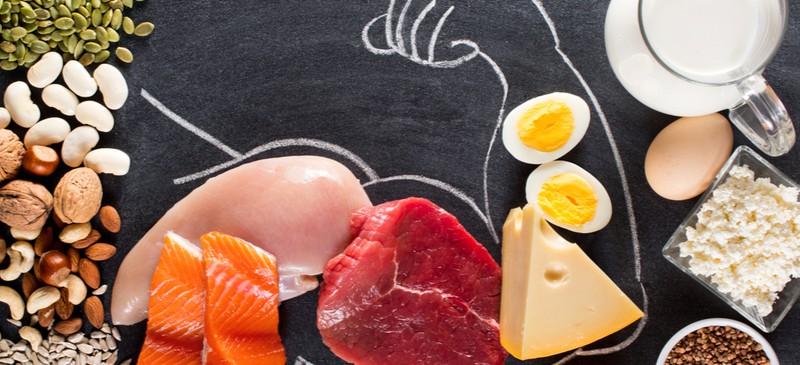This Dr. Axe content is medically reviewed or fact checked to ensure factually accurate information.
With strict editorial sourcing guidelines, we only link to academic research institutions, reputable media sites and, when research is available, medically peer-reviewed studies. Note that the numbers in parentheses (1, 2, etc.) are clickable links to these studies.
The information in our articles is NOT intended to replace a one-on-one relationship with a qualified health care professional and is not intended as medical advice.
This article is based on scientific evidence, written by experts and fact checked by our trained editorial staff. Note that the numbers in parentheses (1, 2, etc.) are clickable links to medically peer-reviewed studies.
Our team includes licensed nutritionists and dietitians, certified health education specialists, as well as certified strength and conditioning specialists, personal trainers and corrective exercise specialists. Our team aims to be not only thorough with its research, but also objective and unbiased.
The information in our articles is NOT intended to replace a one-on-one relationship with a qualified health care professional and is not intended as medical advice.
10 Signs of a Protein Deficiency + How to Fix
April 8, 2024

Whether you’re a weekend warrior, you’re trying to lose weight or you’re an athlete, protein is important for everybody, and you certainly don’t want a protein deficiency.
Even though most people eating a “standard Western diet” consume enough protein overall, many people don’t necessarily eat the highest quality sources of protein and as a result may be deficient in certain essential amino acids.
How do you know if you need more protein? The most common protein deficiency symptoms include weakness, increased hunger and fatigue.
In this article we’ll look at the benefits of eating more high-protein foods — including high-protein snacks — in general, ways to add more quality protein to your diet, and how much you should consume based on factors like your weight, gender and activity level.
What Is Protein Deficiency?
Protein is defined as “a class of compounds that consist of large molecules composed of one or more long chains of amino acids that are essential part of all living organisms, especially as structural components of body tissues such as muscle, hair, collagen, etc., and as enzymes and antibodies.”
You can think of protein as the building block of your body. It’s present in many of the foods that you eat, and it can help boost your metabolism and fat-burning potential.
Foods that contain protein provide us with amino acids, some of which we must get from our diets because we our bodies cannot make them on their own. These are called “essential amino acids.”
Amino acids can be found in many different types of foods, even vegetables, but the highest sources are those that come from animals – like meat, dairy, eggs and fish – plus to a lesser extent certain plant foods like beans and seeds.
Vital organs, muscles, tissues and even some hormones of the body are made from proteins. Additionally, proteins create hemoglobin and important antibodies.
Proteins are involved in just about every body function from controlling blood sugar levels to healing wounds and fighting off bacteria.
Certain proteins also play an important, even critical, role in aging. In fact, some studies suggest that low protein intake, irrespective of the source, may be associated with a small increase in risk of all-cause mortality among older adults.
Simply put, without proteins life would not exist, and that’s why it’s important to avoid protein deficiency.
Causes
Another name for protein deficiency is hypoproteinemia (a condition in which a person has very low levels of protein in the blood).
Each person is unique in terms of her or his exact protein needs. Your body weight, gender, age, and level of activity or exercise all determine how much protein is best for you, and your needs likely vary a bit day to day too.
Proteins are used every day to keep the body going. Because they’re needed to develop, grow and maintain just about every part of our bodies — from our skin and hair to our digestive enzymes and immune system antibodies — they’re constantly broken down and must be replaced via foods in your diet.
If you don’t consume enough protein daily, you may begin to notice a deterioration in your overall health.
What puts you at risk for protein deficiency? Risk factors include:
- Eating a vegan or vegetarian diet, which excludes animal sources of protein.
- Being very active and exercising a lot.
- Having trouble with absorption of protein due to gut-related issues.
- Over-consuming alcohol and some drugs that can disrupt absorption.
- Around the world, severe protein deficiency most commonly occurs in children living in developing countries who don’t consume a variety of foods or enough calories in general.
Signs/Symptoms
What are the symptoms of protein deficiency? Some research suggests that protein deficiency can contribute to both short-term and long-term symptoms. For example, it may increase the risk for developing cataracts, heart problems and muscle atrophy — all somewhat common in the elderly.
Eating too little protein can result in these symptoms:
- Increased appetite
- A sluggish metabolism
- Trouble losing weight
- Trouble building muscle mass and loss of existing muscle mass
- Low energy levels and fatigue
- Poor concentration and trouble learning
- Moodiness and mood swings
- Muscle, bone and joint pain
- Blood sugar changes that can lead to diabetes
- Slow wound healing and poor skin health, including loss of elasticity
- Low immunity
- Edema
- Fatty liver
- Stunted growth (in children)
- More severe infections
- Anemia
Here’s more about how protein deficiency can mess with your health, plus signs to look out for that may indicate your diet is lacking certain amino acids:
1. You have high cholesterol
High cholesterol and triglycerides are not just caused by eating fatty foods — they are also a result of increased inflammation, hormonal imbalances and high-processed/high-sugar diets.
If you tend to replace protein foods with sugary snacks, refined carbs and packaged convenient goods, your cholesterol can start to rise as your liver and cells process fats less efficiently.
Some studies have even found an inverse relationship exists between protein intake and risk of heart disease.
2. You’re feeling more anxious and moody
Amino acids are the building blocks for neurotransmitters that control your mood. Proteins help the brain synthesize hormones like dopamine and serotonin that help bring on positive feelings like calm, excitement and positivity.
3. Your workouts are suffering
Studies generally show that among athletes a higher protein diet is superior to a lower protein diet in terms of increasing fat-free mass. You’re probably already aware that protein is needed to build new muscle mass, but it’s also important for sustaining your energy and motivation.
A low-protein diet can result in muscle atrophy (wasting), fatigue and even fat gain. It can also be behind female athlete triad, a problem that contributes to irregular periods and loss of bone mass. In fact, you can work out more but see fewer results if your diet isn’t adequate to support tissue repair or your energy needs.
4. You aren’t sleeping well
Poor sleep and insomnia can sometimes be linked to unstable blood sugar levels, a rise in cortisol and a decrease in serotonin production. Blood sugar swings during the day carry over through the night.
Carbohydrates require much more insulin than fat or protein. Eating foods with protein before bed can help with tryptophan and serotonin production, and they have a minimal effect on blood glucose levels. In fact, protein slows down the absorption of sugar during a meal.
5. You have “brain fog”
Protein is needed to support many aspects of healthy neurological functioning. Brain fog, poor concentration, lack of motivation and trouble learning new information can be signs that you’re low in neurotransmitters that you need to focus, including dopamine, epinephrine, norepinephrine and serotonin.
Neurotransmitters are synthesized in the brain using amino acids, and studies show that balanced diets with enough protein can boost work performance, learning and motor skills. Bone broth and its l-glutamine can help with brain fog.
6. You’re gassy and can’t go to the bathroom
Many metabolic and digestive functions depend on amino acid intake. If your body feels fatigued and run down in general due to protein deficiency, enzyme production, muscle contractions in your gastrointestinal tract and digestion in general will suffer.
7. Your pants are feeling tighter
Some research show that diets deficient in protein often lead to an increase food consumption, body weight and fat mass.
Although sometimes higher in calories than carbs, high-protein foods cause increased satiety to a greater extent than carbohydrates or fats do, so they can prevent overeating and snacking. They also help stabilize your blood sugar, allow you to retain more muscle, which burns more calories all day, and can reduce cravings.
8. Your menstrual cycle is irregular
One of the most common reasons women suffer from irregular periods and infertility is the condition known as polycystic ovary syndrome (PCOS). Two major risk factors for PCOS are obesity and prediabetes or diabetes.
Low-protein, high-sugar/high-carb diets can contribute to insulin resistance, fatigue, inflammation and weight gain that disrupts the delicate balance of female hormones (including that of estrogen, progesterone and DHEA) needed to sustain a regular cycle.
9. You’ve been getting injured more often and are slow to heal
A low-protein diet can raise your risk for falling, slow bone healing, bone weakness, fractures and even osteoporosis. Protein is needed for calcium absorption and helping with bone metabolism.
Studies show that older adults with the greatest bone losses are those with a low protein intake. Research also shows that a diet high in amino acids can help treat muscle loss due to aging.
10. Your hair, nails and skin aren’t as youthful and strong
Connective tissue, skin, hair and nails are mostly made up of protein, including collagen and elastin. When your diet lacks collagen and certain amino acids, it can be harder to repair wounds, keep skin’s youthful texture, and to maintain thick hair and prevent breakage.
How Much Protein Do You Need?
The best way to get all the essential amino acids you require is to include protein-rich foods in your meals. This applies to both people who eat animal sources of protein as well as plant-based eaters.
How much protein do I need a day? The average person probably needs half his or her body weight in grams of protein a day.
So if you weigh 150 pounds, you need at least around 75 grams of protein a day if you’re trying to burn fat and build muscle the right way.
For many athletes, more than that is going to be essential as well.
- The recommended daily minimum intake of protein for adults who are at an average weight and activity level is 56 grams per day for men and 46 grams per day for women. However, these are considered minimum amounts, so they might be too low if you’re very active, pregnant or ill.
- These amounts are equal to eating about 0.36 grams of protein for every pound that you weigh — however some people find that they feel better when they increase their protein intake and aim to eat about 0.5 grams of protein for every pound.
- This higher recommendation would translate to a woman who weighs 150 pounds eating about 75 grams of protein daily and a man who weighs 180 pounds eating about 90 grams.
- If all the math seems confusing, remember that most experts recommend consuming about 20 percent to 30 percent of your overall calories from protein foods.
Best Protein Foods
Overall, eating a mix of plant-based and animal-based options is the best approach to getting enough protein. Some call this approach the flexitarian diet.
While animal products have more protein per calorie than most plants do, eating too much meat, dairy, fish or eggs every day isn’t the best idea and has its own drawbacks (such as being less environmentally sustainable, more expensive and more acidic).
Vegetarian proteins often double as a great way to get more fiber, antioxidants, electrolytes and other nutrients, so try including plant-based protein foods in your meals often in place of meat. Plus, studies show our bodies can take incomplete plant proteins and make them complete by utilizing amino acid recycling mechanisms.
- Vegetarian and vegan protein options that still provide a good deal of amino acids include all types of beans and legumes, especially adzuki beans, mung beans and lentils; nuts and seeds, such as almonds, flax, chia and hemp; unprocessed/ancient grains like oats, buckwheat, amaranth, farro or quinoa. It’s an added bonus if you consume sprouted nuts, legumes and grains since this helps make their amino acids more absorbable once eaten.
- Even some vegetables have a fairly high concentration of protein, especially considering how low in calories they are. Veggies that help boost your protein intake include spinach, kale, broccoli, Brussels sprouts and mushrooms.
- When it comes to using protein powders, several new and noteworthy types have recently hit the market. These include pea protein, whey protein and also protein powder made from bone broth. There are many benefits to consuming these types or powders since they offer much more than simply protein – for example, bone broth also supplies collagen and glucosamine, which are great for your GI tract, joints and skin.
- For meats, the best forms of protein you can be getting are going to be things like grass-fed beef, organic chicken and turkey, and wild-caught salmon.
Final Thoughts
- Protein deficiency is also called hypoproteinemia, a condition in which a person has very low levels of essential amino acids in the blood.
- What happens if you are deficient in protein? Conditions and symptoms that can result from this type of deficiency include weakness, a slowed metabolism, reduced strength and exercise performance, lack of concentration, mood issues, and more.
- Whether you eat a plant-based diet or include animal products in your meals, the best way to get enough amino acids is to emphasize foods in your diet like meat, dairy, eggs, fish, yogurt, beans, nuts, seeds and whole grains.
- Aim to eat about 0.4 to 0.5 grams of protein for every pound of body weight.












